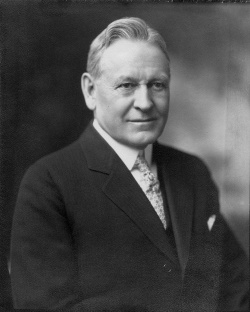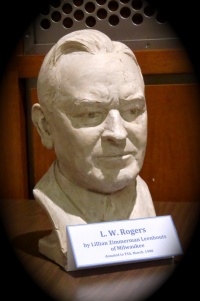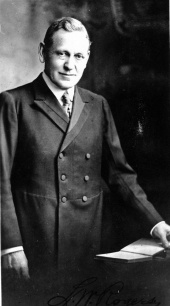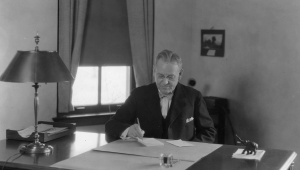L. W. Rogers

Louis William Rogers was an American lecturer and editor who served from 1920 to 1931 as General Secretary of the American Theosophical Society of the Theosophical Society based in Adyar.
Early life
Louis William Rogers was born in the Midwestern state of Iowa on May 28, 1859. He taught in the public schools of Iowa and Kansas for five years, beginning late in the 1870s.[1]
In the 1880s Rogers became a public lecturer on Freethought and its underlying philosophical doctrine of Rationalism.
Railroad career and union activities
Rogers began a railroad career with a job as a brakeman, and went on to edit a series of periodicals related to railroads and their unions. In 1888 Rogers launched a short-lived newspaper, the Railroad Patriot of St. Joseph, Missouri.[1] The next year, he moved to Colorado, where he first became active in the Brotherhood of Railroad Brakemen and then the Brotherhood of Railroad Trainmen.[1] From 1889 to 1892 he edited several periodicals - the Railroad Brakemen's Journal, the Denver Patriot, and the Vona Herald. Early in the 1890s Rogers returned to the Midwest, moving first to the rail hub of Galesburg, Illinois, then to Chicago, and finally in 1892 to Oshkosh, Wisconsin. He published a new paper, the Age of Labor, which merged in 1893 with The Labor Advocate, a prominent labor newspaper of the day.[1] That year he helped to establish the Wisconsin Federation of Labor.[1]
American Railway Union activities
In 1894, former Brotherhood of Locomotive Firemen official Eugene V. Debs established the American Railway Union (ARU), attempting to create an industrial union that joined all the railway workers in a powerful, centralized organization. Rogers became a member of the ARU's executive board, and was appointed editor of the organization's weekly newspaper, Railway Times.[1] In 1894, the United States Attorney General responded to the ARU's famous Pullman Strike by issuing an injunction ordering the union to cease striking against any train carrying U.S. Mail.[2] L. W. Rogers, Eugene V. Debs, and two other union officials were found to be in contempt of the injunction, and they surrendered to authorities on July 17, 1894. Bail was set at $3,000 each, and all four ARU officials waived the right to post bail. They were immediately taken to Cook County Jail. Rogers later recalled that the substantial amount set for bail was not the cause of this decision, declaring, "If it was $2, I'd go to jail. This is a mighty test between labor and capital, and we will fight it to the finish."[3] The four were released on July 25.[4] After a trial, the union and its leaders were found guilty of having conducted an illegal strike in violation of the Sherman Anti-Trust Act.[5] Rogers was sentenced to three months to be served in McHenry County Jail, which was served from June to August, 1895.[6] Debs and the union were subjected to further charges in a case that was defended all the way to the U. S. Supreme Court by the famous orator Clarence Darrow, although the unionists ultimately lost.
Later union activism
Rogers moved to Pueblo, Colorado, where he worked as an organizer for the American Federation of Labor, and edited another labor newspaper in 1896, the Industrial Advocate.[1] In 1897 he returned to Chicago to edit The Social Democrat, the journal of Eugene V. Debs' new politicl party, the Social Democratic Party of America. He also helped to organize Debs' lecture tours for two years.[1] He remained involved with the labor movement, serving as President of the Michigan Federation of Labor from 1898 to 1899.[1]
Lecturing for the Theosophical Society
In the 20th Century, Rogers' attention turned to spirituality, supposedly after Eugene V. Debs gave him a book about reincarnation.[7]. In 1903 Rogers joined the American Theosophical Society.[8] He threw himself whole-heartedly into the Theosophical movement, lecturing extensively and publishing numerous books, articles, and pamphlets on reincarnation, life after death, karma, and dreams, and other matters. A firebrand speaker, Rogers was much in demand as a lecturer. He was elected Vice President in 1918 during the administration of A. P. Warrington. In 1920 was elected as President (General Secretary) in a contentious summer convention.
President of the American Theosophical Society
In 1920 alone, he opened 55 branches of the Society. A tireless organizer, he continually lectured all over the country.
His first actions as President were decisive. He moved headquarters from Hollywood back to Chicago, which he considered to be more suitable due to its central location. He replaced the National Secretary, Foster Bailey and the editor of the Society's periodical, Theosophical Messenger??? Alice (later Alice Bailey).
Later years
Following his time at the helm of the TSA, Rogers served as the editor of two of the organization's periodicals — Ancient Wisdom, which he edited from 1935 to 1936, and The Voice, from 1951 to 1952.[1]
Louis Rogers died in 1953.
Writings about Theosophy
- The Evidence for Theosophy: A Lecture. Harrogate: Theosophical Publishing Committee, 1906.
- The Occultism in Shakespeare's Plays. New York: Theosophical Book Co., 1909.
- Occultism as a Factor in Civilization: A Lecture on the Two Phases of Human Evolution Represented in the Civilization of the Occident and the Orient. Ridgewood, NJ: Theosophical Book Company, 1910.
- The Hidden Side of Evolution: A Lecture on the Reasonableness of the Existence of a Spiritual Hierarchy and the Guidance of Human Evolution. Chicago: L.W. Rogers, n.d. [c. 1910s].
- What Theosophy Is. Chicago: National Publicity Department, Theosophical Society, 1910.
- Soul Powers and Possibilities: A Lecture on Some of the Methods of Nature in Evolving Latent Powers and Faculties in Human Beings. Los Angeles: Theosophical Book Concern, 1910.
- Karma: Nature's Law of Justice: A Lecture on the Law of Cause and Effect as Operating in Some of the Affairs of Love. Los Angeles: Theosophical Book Concern, n.d. [c. 1910s].
- Hints to Young Students of Occultism. Los Angeles: Theosophical Book Concern, 1915.
- The Inspired Life. Los Angeles: L.W. Rogers, 1915.
- Self Development and the Way to Power. Los Angeles: L.W. Rogers, 1916.
- Elementary Theosophy. Los Angeles: Theosophical Book Concern, 1917.
- The Life Sublime. Chicago: Theosophical Book Co., 1917.
- Reincarnation from the Scientific Viewpoint: A Lecture. Chicago: Theosophical Book Co., 1917.
- Reincarnation: Do We Life on Earth Again? Chicago : National Publicity Dept., Theosophical Society, 1917.
- The Logic of Reincarnation: A Lecture. Chicago: Theosophical Book Co., 1918.
- Beyond the Border: A Lecture. Chicago: Theosophical Book Co., 1918.
- Occultism as a Factor in Civilization: A Lecture. Chicago: Theosophical Book Co., 1918.
- Scientific Evidence of Future Life: A Lecture. Chicago: Theosophical Book Co., 1918.
- The Invisible World About Us: A Lecture on the Unseen Regions Beyond the Grasp of the Physical Senses and the Life We Live After Bodily Death. Chicago: Theosophical Book Co., 1918.
- Australian War Speeches and the Soldier Dead. Chicago: Theosophical Book Co., c. 1918.
- Dreams and Premonitions. Chicago: Theo Book Co., 1923.
- Theosophical Questions Answered. Chicago: Theo Book Co., 1924.
- Gods in the Making, and Other Lectures. Chicago: Theo Book Co., 1925.
- The Purpose of Life, and Other Lectures. Chicago: Theo Book Co., 1925.
- The Soldier Dead; and A Scientific Religion. Chicago: Theo Book Co., 1925.
- Universal Brotherhood. Chicago: Theo Book Co., 1925.
- Hints to Students of Occultism. Chicago: Theo Book Co., 1931.
- The Coming Civilization. Chicago: Theo Book Co., 1934.
- Olcott Manual: First Series: Theosophy, Religion, Science, Philosophy. With Annie Besant. Wheaton, IL: Theosophical Press, 1934.
- Reincarnation, and Other Lectures. Wheaton, IL: Theosophical Press, n.d. [1940s].
- The Ghosts in Shakespeare: A Study of the Occultism in the Shakespeare Plays. Wheaton, IL: Theosophical Press, 1949.
- Man: An Embryo God, and Other Lectures. Wheaton, IL: Theosophical Press, 1950.
- Karma: The Law of Human Destiny. New York : Philosophers Book Shop, n.d.
Notes
- ↑ 1.0 1.1 1.2 1.3 1.4 1.5 1.6 1.7 1.8 1.9 Stuart B. Kaufman, Peter J. Albert, and Grace Palladino (eds.), The Samuel Gompers Papers: Volume 4: A National Labor Movement Takes Shape, 1895-98. Urbana, IL: Illinois University Press, 1991: 547-548.
- ↑ David Ray Papke, The Pullman Case: The Clash of Labor and Capital in Industrial America. Lawrence, KS: University Press of Kansas, 1999; pg. 40.
- ↑ Quoted in Papke, The Pullman Case, pg. 44.
- ↑ J. Robert Constantine (ed.), Letters of Eugene V. Debs: Volume 1, 1874-1912. Urbana, IL: Illinois University Press, 1990; pg. 72.
- ↑ Papke, The Pullman Case, pp. 49-50.
- ↑ Constantine (ed.), Letters of Eugene V. Debs: Vol. 1, pg. 98, fn. 9.
- ↑ ??reference needed
- ↑ Robert Bonnell and Leatrice Kreeger-Bonnell, "Memories of L.W. Rogers," Quest, vol. 92, no. 6 (Nov.-Dec. 2004), pp. 224-226.



